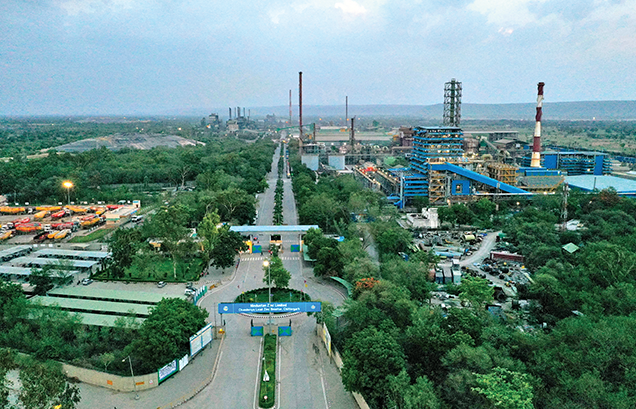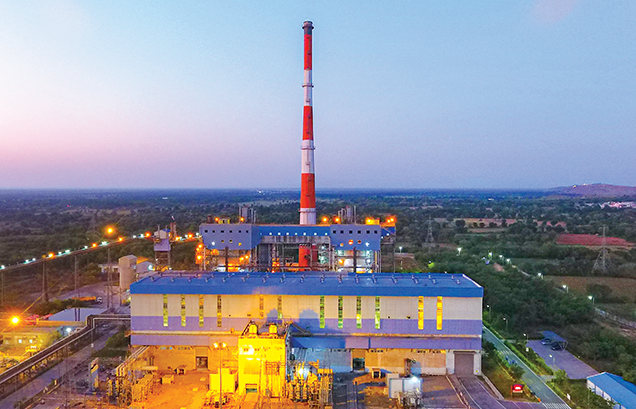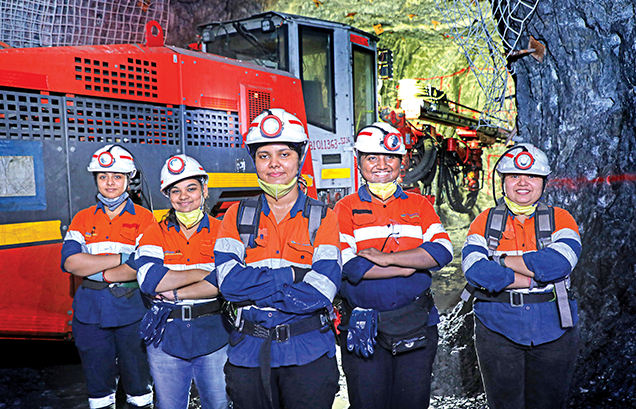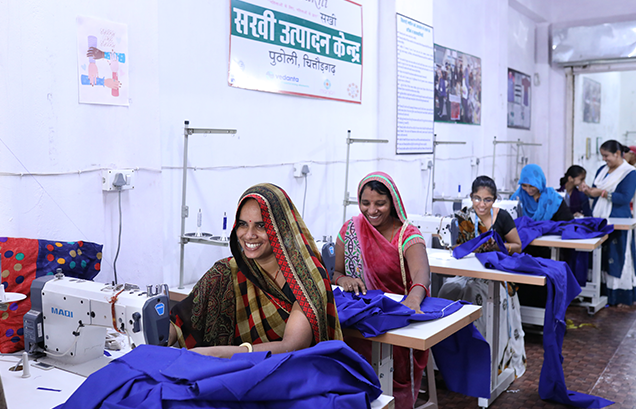Transformation through responsiveness
The natural resources sector operates amid a dynamic external environment. Several megatrends shape the industry, which are broadly led by aspects of ESG, digitalisation, value chain management, social stewardship, and others. These key trends are discussed below.
T1
Aligning capital allocation to ESG commitments
Environmental, Social and Governance (ESG) has become an essential part of the guiding strategy of organisations operating in the natural resources sector. Given the fast-evolving expectations from the markets and their stakeholders with regard to ESG alignment, the need of the hour is to think holistically and reflect capital allocation according to their ESG commitments.
Vedanta’s response
As part of Vedanta’s larger ESG vision, the Company has charted a clear plan to achieve Net Carbon Zero status by or before 2050. A US$5 billion investment has been pledged over the next decade to accelerate this transition. Similarly, a significant component of the capital allocation has been earmarked for social interventions in the near future.

T2
Embedding ESG into operations
While most mining companies have been under the radar for environmental and social compliance, led by global norms and regional regulations, voluntary compliance to ESG has been on the rise. The opportunities arising from mainstreaming ESG in operations present a host of business benefits for companies, while helping them manage their upside and downside risks.
Vedanta’s response
Vedanta has formulated its new ESG purpose – Transforming for Good – which maps specific aims under the pillars of communities, planet and workplace. The new purpose is adopted across the organisation with a view to make Vedanta an ESG-first organisation.

T3
Playing an enabling role for a low-carbon future
The metals and mining sector has a key role in enabling the global energy transition. Several of the materials used in renewable technology, for example, are naturally occurring in nature, and the extraction, processing and marketing of such material is essential for an accelerated, global shift towards green energy adoption.
Vedanta’s response
Vedanta’s deeply integrated value chain ensures that necessary minerals for all renewable energy infrastructure are made available. Some of the key minerals that Vedanta extracts, processes and markets, such as Zinc, Aluminium, and Silver, are core to enabling the RE transition. To this effect, we have launched several pilot programmes including the introduction of low-carbon green aluminium under the Restora franchise. We are also exploring the development of green copper with a scalable plan in the pipeline.
We have committed to becoming a Net Zero Carbon company by 2050 or before and achieve 25% absolute GHG reduction by 2030. We plan to achieve this by deploying renewable power to the tune of 2.5 GW RE RTC equivalent by 2030. We will also switch our fuels to more sustainable energy sources such as biomass and natural gas and deploy electric vehicles as part of our fleet. Significant progress has been made on this front with businesses such as HZL, ESL and BALCO leading from the front.

T4
A new super-cycle for commodities
Post the global pandemic, the metals and mining industry has soared with the release of pent-up demand, accompanied by buoyant pricing. The opportunity space is clear for large-scale commodity players such as Vedanta to hedge against possible risks and serve the demand with prudence.
Vedanta’s response
Vedanta is well positioned to deliver superior performance operationally and financially. In Oil & Gas, Vedanta is the largest private sector producer of crude oil in India and ranks among the world’s lowest cost producers with a pipeline of assets in production, development, and exploration. In Zinc, the Company is the world’s largest fully integrated zinc-lead producer. In Aluminium, it is India’s largest primary aluminium producer supported by its own captive power generation. With the successful acquisition of a Nickel and Cobalt plant at Goa, Vedanta has become the sole producer of Nickel in India. We continue to deliver strong performance across our business verticals, driven by our asset quality and strength of business model. We have achieved record production across Zinc International and Aluminium businesses and have a strong pipeline of development for other businesses such as Oil & Gas. Together with our underlying strengths and a conducive market scenario, we are well placed to achieve continued growth across our businesses.

T5
The need for competitive employer value propositions
The world over, the labour market has evolved during and post the pandemic. ‘The Great Resignation’ has seen waves of employees quit their jobs in pursuit of opportunities that are better aligned to their interests. Work from home has nearly become a well received alternative to traditional modes of office. Social purpose, reimagining work, and building an inclusive leadership culture have become core to maintaining an attractive employer value proposition. It is harder for core industries such as mining, where physical presence and conventional ways of working have ruled the roost for long.
Vedanta’s response
Increased efforts on employee engagement and retention; an emphasis on diversity, equity and inclusion; and a razor-sharp health and safety focus are key to attracting industry-best talent to Vedanta.

T6
Corporate citizenship as a key value enabler
Indigenous communities around the world are now distancing themselves from conventional transactionalstyle relationships with corporates. They are keen to establish novel ways of connecting and understanding entities that operate in their backyard and assigning responsibilities to them in exchange of continued social licence to operate. This puts the onus on companies, especially in the natural resources sector to look for and pursue opportunities that align with local communities’ own goals and priorities.
Vedanta’s response
Vedanta strives to be the preferred developer of choice in most of its core regions of operations. We enable this by establishing long-lasting community relationships, adhering to globally accepted human rights practices, and by actively investing in the communities through our operational and philanthropic interventions.

T7
Integrated and data-led decision making for winning the future
To ensure agility and responsiveness, mining companies must empower the workforce across all levels to take informed, data-driven decisions. Digitalisation has proven its utility in ways more than one in the natural resources sector across the value chain. However, investments in technology must be met with proportionate interventions to create people-system interactions that can multiply the benefits of digitalisation.
Vedanta’s response
With our Disha programme, we aim to transform Vedanta into a data-driven organisation by developing digital dashboards and applying analytics for different verticals and business functions. These analytical dashboards enable the management to track progress, get insights, identify issues and bottlenecks proactively. This is achieved through reliable monitoring of KPIs across operations and HSE, critical process parameters for equipment and dataled predictability. This results in better planning, mitigation and closing the decision loop faster.
Apart from this, we are also building a start-up culture through the Spark program and implementing Group-wide digital transformation through project “Pratham”, which focuses on significantly improving volume, cost and ease of doing business. This is implemented through global partners by bringing new emerging technologies across the value chain of Vedanta Industry 4.0 framework. This is expected to result in a 15% increase in EBITDA, contribute to our zero-harm goal and reduce our carbon footprint.
To sustain our digital transformation, a roadmap has been drawn up for redesigning the organisation and augmenting digital capabilities, complete with in-house data analysts and data scientists.
